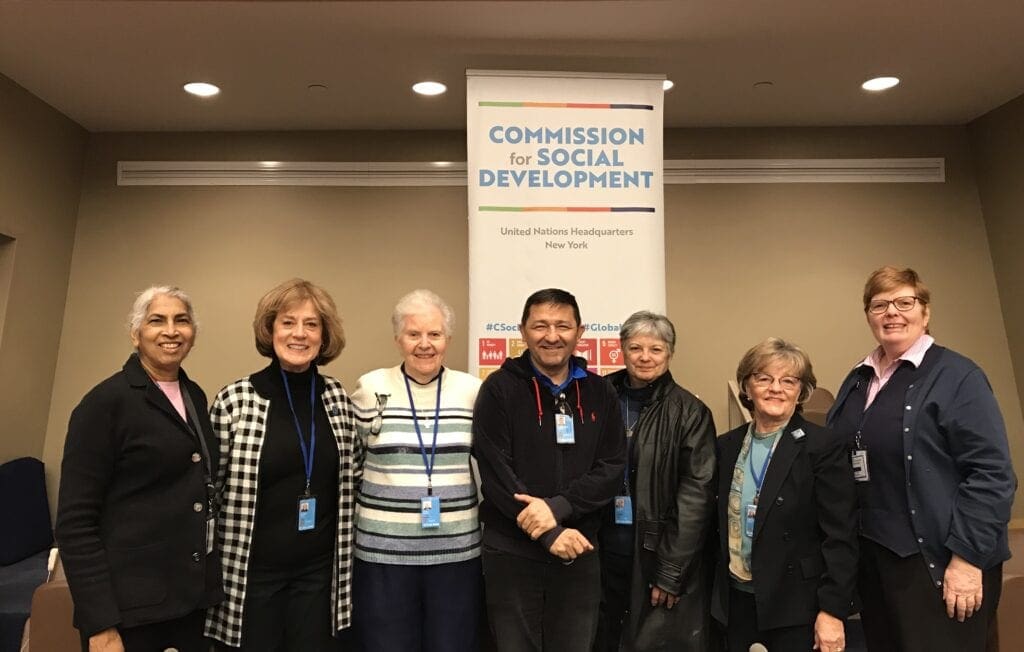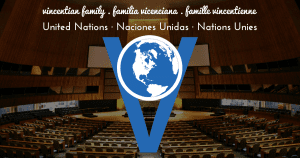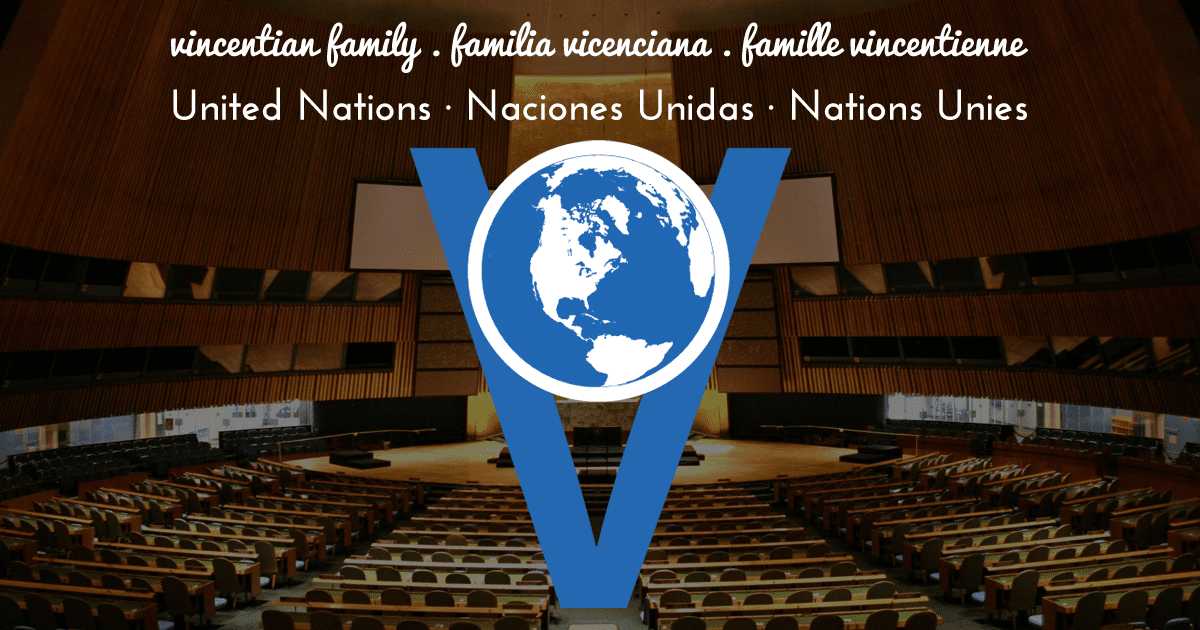A Roadmap for Advocacy to End Homelessness

The Vincentian Family initiative to end homelessness was announced in October 2017 during the 400th anniversary celebration of its Charism. The Vincentian Family NGOs took up the call to end homelessness for their advocacy at the United Nations along with other NGOs based in New York. The tireless efforts of the NGOs and various Vincentian Family entities from 2018 resulted in having a priority theme: “Affordable housing and social protection systems for all to address homelessness,” for the 58th session of the Commission for Social Development in February 2020. Although article 25 of the Universal Human Rights (UDHR) states that ‘everyone has the right to adequate housing…’ during its 75 years of existence, the UN had never addressed the issue of homelessness. The 2030 Agenda for Sustainable Development failed to give greater focus to this global problem and included it in SDG 11 on sustainable cities and communities: “Ensure access for all to adequate, safe and affordable housing and basic services and upgrade slums.” In this context, the 58th Session of the Commission for Sustainable Development has historic significance. For the first time, the UN has issued a resolution on homelessness, describing it and calling on member states to measure it. It is a testament to the power of advocacy, collaboration and partnerships among NGOs, people who experience homelessness, Member States and the UN.
What are some significant outcomes from the resolution? Members of the Civil Society, through its declaration had asked the Commission for the international consensus on housing as a basic human right and a vital component of the right to an adequate standard of living, as expressed in UDHR 25. This is reflected in #4 of the resolution: “Calls upon Member States to ensure the promotion and protection all human rights, in accordance with their obligations under international human rights law, while recognizing that homelessness constitutes a violation of human dignity and may be an obstacle to the fulfillment of all human rights and that urgent national and international action is therefore required to address it.”
The other major ask was for a globally agreed upon language to describe and define homelessness to enable Member States to measure and address the systemic drivers of homelessness. Instead of a definition, there is a detailed description in #7: “Notes that homelessness is not merely a lack of physical housing, but is often interrelated with poverty, lack of productive employment and access to infrastructure, as well as other social issues that may constitute a loss of family, community and a sense of belonging, and depending on national context, can be described as a condition where a person or household lacks habitable space, which may compromise their ability to enjoy social relations, and includes people living on the streets, in other open spaces or in buildings not intended for human habitation, people living in temporary accommodation or shelters for the homeless, and, in accordance with national legislation, may include, among others, people living in severely inadequate accommodation without security of tenure and access to basic services.”
How many people are homeless in our world? In the absence of an agreed definition, no reliable data is available. Census data from most countries do not reflect the real number of homeless people. It is commonly said, “What is not counted, is not valued,” and it is very true of our attitude towards people who experience homelessness. Another Civil Society request was to make data collection and this is addressed in #12: “Calls upon Member States to collect disaggregated data on demographics, such as by age, sex and disability, related to homelessness and establish categories of homelessness, accompanying the existing measurement tools, and encourages Member States to harmonize the measurement and collection of data on homelessness to enable national and global policy making.”
If all countries acted on their pledge to eradicate poverty in all its forms through the implementation of the 2030 Agenda for Sustainable Development, the Paris Climate Agreement and the Addis Ababa Action Agenda, the need to revisit these issues would not arise. Given the lack of commitment, it is important that the drivers of homelessness – structural poverty, inequality, unemployment and underemployment, insecure informal employment, illness, disability, discrimination and social exclusion, lack of affordable and accessible housing, forced evictions, rural-urban migration, displacement due to disasters, etc., is addressed in the resolution. To live in dignity, people who homeless need access to basic services, like education, healthcare, employment, minimum wages, women’s participation in labor, and social protections systems. These concerns have been addressed in the following manner:
Member States are encouraged to (#13) “promote affordable and equitable access to basic services, in particular quality formal and non-formal education, at all levels…promote equality and inclusion through the affirmation of the fundamental dignity of the human person, and healthcare, including through the acceleration of the transition towards equitable access to universal health coverage, as well as access to affordable housing, nutrition and food, and access to employment and decent work, information and communications technology and infrastructure, through advancing gender equality and the empowerment of women and girls:”
Member States are invited to (#14) “consider adopting labor market policies that strengthen institutions and provide adequate labor protection to all workers, especially to the most disadvantaged. They are encouraged to (#15) “implement policies that support the full and productive participation of women in the labor market, including women with disabilities, and promote equal pay for equal work or work of equal value, access to childcare facilities, the reconciliation of family and professional life, and the sharing of responsibilities between parents…”
National and local governments are encouraged to (#16) “improve access to affordable housing through integrated housing policies and social protection measures…and to address legal and policy barriers to equal and non-discriminatory access to adequate housing, including for women of all ages and women-headed households…protection against unlawful forced eviction, the provision of adequate emergency and temporary shelter and services and security of tenancy and support for the development of affordable housing…” They are invited to (#17) “collaborate with private sector and local communities, to stimulate the supply of a variety of adequate housing options that are safe affordable, and accessible for members of different income groups.” They are called to (#18) “increase allocations of financial and human resources for the upgrading and, to the extent prevention of slums and informal settlements” is significant, since 1.6 billion people lack adequate housing.
The important role families play in combatting social exclusion is recognized, and “encourages the Member States to enact inclusive and responsive family-oriented policies and programs in education, training, decent work, work-family balance, health care, age sensitive social protection systems and measures, child allowances, etc., to confront social exclusion…(#32) There is a call “to combat discrimination and negative stereotypes against people experiencing homelessness, including by strengthening anti-discrimination laws, advocacy and awareness raising.” (#34)
Affordable housing policy is insufficient to end homelessness without social protection systems and floors to address multiple, often interrelated and complex causes of homelessness. They contribute to the realization of human rights of all people. To this end, Member States are urged to (#21) “establish as quickly as possible and maintain the social protection floors that comprise basic social security, so that those in need can access essential health care, including maternity, newborn, child, long-term and palliative care…basic income security for children, persons of active age who are unable to earn sufficient income, in particular in cases of sickness, unemployment, maternity and disability…and for older persons, as set out in the Social Protection Floors Recommendations, 2012 (No. 202) of the International Labor Organization.” They are invited to formulate and implement national strategies to extend social security and essential social services to people below the poverty line and are negatively affected by climate change and natural and human-made disasters. (#28)
Although the primary responsibility to end homelessness is with the governments, the document is calling upon the UN system, civil society organizations, philanthropists and all other actors to build broad-based partnerships at all levels to raise awareness on homelessness, including family and youth homelessness, and to prevent people from falling into homelessness and support those experiencing homelessness through long term sustainable solutions to end homelessness.
We have a roadmap for our advocacy work ahead at the local, national and global levels.
Link to Resolution: https://undocs.org/E/CN.5/2020/L.5
Teresa Kotturan SCN
NGO Representative
Sisters of Charity Federation

Tags: United Nations







Thank you for this encouraging report on collaborative action from the UN! Our inter-provincial committee on homelessness will aim to support your spearheading work!
Thank you Sister Honora. We all need to take it forward.